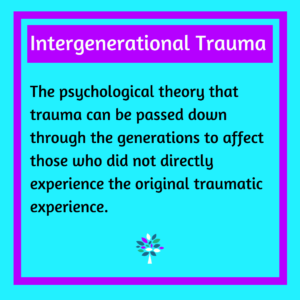Intergenerational Trauma

It is really only within the last 100 years or so that we have started to recognize that the effect of trauma does not necessarily end with the person who experienced it.
Intergenerational trauma was first researched in 1966 in looking at the high rates of psychological distress among children of Holocaust survivors.
Trauma can be passed down from one generation to another in a variety of ways. The first way understood in the field was through child rearing practices. Trauma can affect how a parent paid attention to, taught and disciplined their children.
Trauma from events such as natural disasters can influence the genes that are suppressed or expressed and these changes can be passed down to the next generation. Trauma experienced by a mother during pregnancy can affect the child’s physiology and psychology. How the family talks about or doesn’t talk about trauma effects how children see the world and the meaning they make from that which can increase the chances of a chronic stress response in the child.
The effects of mass cultural trauma and suppression have been found to echo across generations, such as those experienced in the US by Native American (genocide, Trail of Tears, and residential schools) and Blacks (slavery, Jim Crow and segregation). This type of past trauma and on-going cultural suppression affects mental health and creates a ripple effect through the generations.










